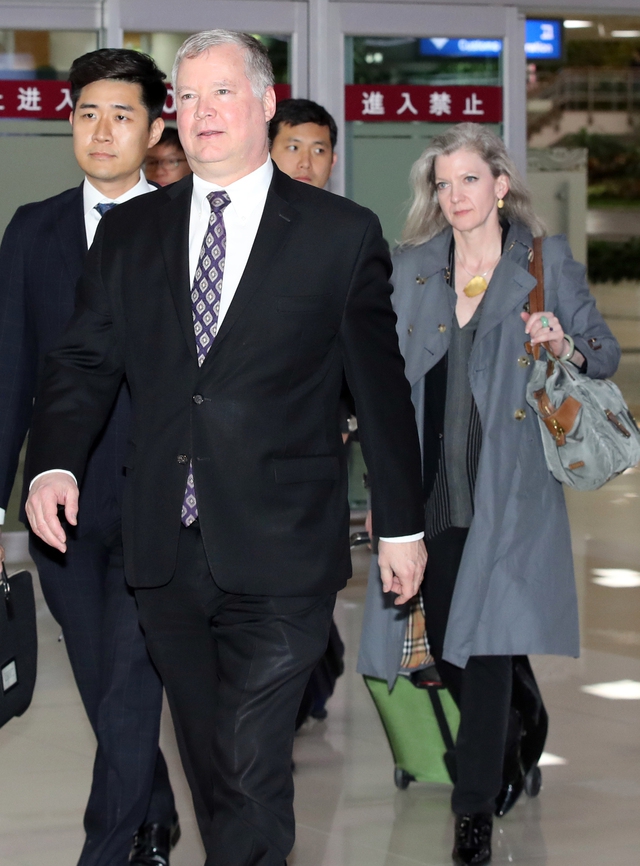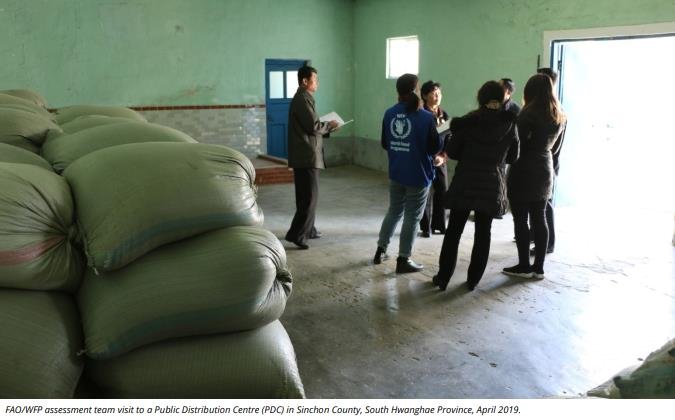Posted on : May.9,2019 16:48 KST
Modified on : May.9,2019 16:55 KST
 |
|
US Special Representative for North Korea Stephen Biegun (center) and Allison Hooker (right), the White House National Security Council’s Korea specialist, arrive at Gimpo International Airport on May 8. (Yonhap News)
|
S. Korea promised 20 months to provide US$8 million in aid via WFP
On May 8, South Korea’s Unification Ministry officially announced it would move ahead with providing food aid to the North Korean people. The announcement came shortly after US President Donald Trump said he supports South Korea providing the North with food aid during a telephone call with South Korean President Moon Jae-in. The next question is whether the South Korean government will carry out the promise it made 20 months ago to provide US$8 million to North Korea through the World Food Programme (WFP) and other organizations.
“Prior to this, we hadn’t been specifically considering [food aid to North Korea]. But after President Moon and President Trump’s phone call on May 7, the decision was made to provide it. We’re planning to begin deliberations with related ministries about the timing, method, and amount of assistance,” an official at the Unification Ministry said on Wednesday.
The results of the South Korea-US working group meeting this week are expected to be a critical watershed. Attending the meeting will be Lee Do-hoon, South Korea’s special representative for Korean Peninsula peace and security affairs, and Stephen Biegun, the US State Department’s special representative for North Korea, who arrived in South Korea on May 8 for his first visit since talks between North Korea and the US broke down during their summit in Hanoi.
Humanitarian aid to North Korea is also likely to be discussed during a meeting between South Korean Foreign Minister Kang Kyung-wha and Unification Minister Kim Yeon-chul and David Beasley, executive director of the World Food Programme, who will be visiting South Korea between May 13-15.
Humanitarian aid to North Korea is one of the few cards the South Korean government can play in a bid to manage the current situation while seeking a way to resume dialogue. Even so, there are considerable obstacles that must be overcome before aid can actually be delivered. Even though Seoul earmarked funds for humanitarian aid to North Korea on Sept. 21, 2017, more than a year passed without the funds being spent, causing the appropriation to expire at the end of 2018. The government’s Inter-Korean Exchange and Cooperation Promotion Council had voted to provide US$8 million to North Korea through the WFP and the UN Children’s Fund (UNICEF). While the Unification Ministry had argued that the aid wouldn’t violate UN Security Council sanctions on North Korea because it consisted not of cash but of physical items such as nutritious food and medicine for children and pregnant women, the aid never went through.
 |
|
A FAO/WFP assessment team visits a public distribution center (PDC) in Sinchon County, South Hwanghae Province, in April 2019
|
Trump admin. uses humanitarian aid as leverage in denuclearization talks
It’s widely known that the failure to execute the US$8 million appropriation was the result of Washington’s opposition and Seoul’s passivity. Crucially, the Trump administration broke with the US’ long-standing practice of not tying humanitarian matters to political and military issues by treating humanitarian aid as leverage in its denuclearization talks with North Korea.
In past working group meetings with South Korea, sources say, the US has steadily maintained that it’s not the right time to provide the North with the US$8 million in aid.
“When we asked the Unification Ministry why it wasn’t sending North Korea the humanitarian aid, an official there told us that the US was continuing to use humanitarian aid as leverage for North Korea’s denuclearization. Everyone in the know is aware that the humanitarian aid to North Korea wasn’t disbursed because of opposition from the US,” a source from the office of a National Assembly lawmaker told the Hankyoreh on May 8.
After South Korea and the US came to an understanding about providing humanitarian aid to North Korea in their working group meeting in December 2018, Seoul arranged to send 200,000 doses of the flu medicine Tamiflu to the North. But even that plan fell through when the US objected that the trucks chartered to carry the Tamiflu were in violation of sanctions against the North.
Do Trump’s remarks to Moon indicate a change in stance toward humanitarian aid?
Since the US government has basically deferred humanitarian aid to North Korea by tethering it to the denuclearization talks, the question of whether Trump’s remarks mark an actual change in this stance is likely to be confirmed during the South Korea-US working group meeting this week. While Trump has previously expressed his support for humanitarian aid to North Korea, lower-level officials in his administration have remained intransigent. During his summit with Moon in Washington, DC, last month, Trump noted that he and Moon were discussing the issue of specific humanitarian aid to North Korea and said that, in all honesty, he was okay with such aid. But even after those remarks, the US government remained critical of humanitarian aid to the North.
Experts say it’s time for a chance of attitude from the US government, which has even blocked aid for pregnant women, children, and the sick.
“The basic purpose of the sanctions is to keep North Korea from advancing its nuclear weapon and missile programs. The sanctions must not cause harm to vulnerable groups or newborns and infants. But the US has consistently used humanitarian aid to the North as a bargaining chip in their denuclearization talks, even though that hasn’t been helpful in the negotiations,” said Hong Min, director of the North Korea research office at the Korea Institute for National Unification.
“The necessity of taking steps to bring about a meaningful improvement in the human rights situation in North Korea is a principle that must be held [by the South Korean and American governments] regardless of the status of the denuclearization negotiations,” said Koo Kab-woo, a professor at the University of North Korean Studies.
By Noh Ji-won, staff reporter
Please direct comments or questions to [english@hani.co.kr]










